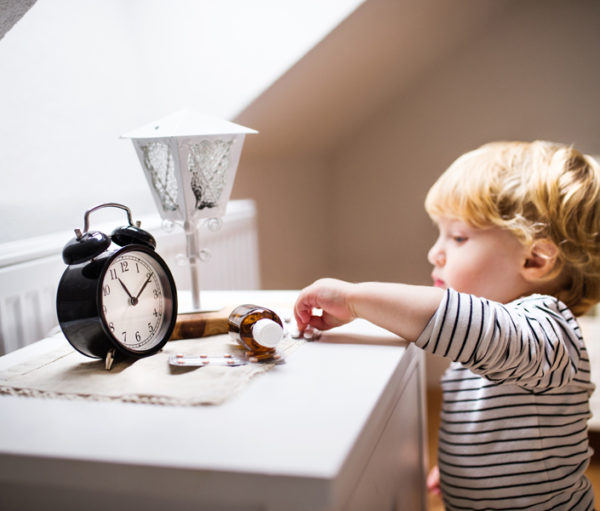Keep Medications Away from Grandkids

During the past year and a half, many grandparents were unable to visit with grandchildren. But soon children will be able to get the COVID-19 vaccine, and that is predicted to make intergenerational gatherings a lot safer. This is a good time for grandparents to refresh their knowledge about another important child safety issue.
According to the Centers for Disease Control and Prevention (CDC), each year 50,000 children go to the emergency room due to unintentional medication poisoning. And experts from the University of Michigan (UM) report that in 40% of these cases, the medications had been prescribed for their grandparents.
“Prescription medicines, and even over-the-counter medicines and supplements, can harm children and teens who find them in Grandma’s purse or on Grandpa’s kitchen table,” said UM researcher Dr. Preeti Malani. “Meanwhile, opioid painkillers and sleep medicines can be diverted for recreational use by teens. No matter how old your grandchildren are, you need to think about medication safety.”
Dr. Malani conducted a poll of more than 2,000 grandparents and found that only 7% stored their medications safely in a locked cupboard or cabinet. The rest stored them on a countertop, in their purse, or in some other unsecured location.
The CDC offers these tips to help grandparents protect grandkids:
Put medicines and vitamins up and away and out of children’s reach and sight. Children are curious and put all sorts of things in their mouths. Even if you turn your back for less than a minute, they can quickly get into things that could hurt them. Pick a storage place in your home that children cannot reach or see.
Put medicines away every time. This includes medicines and vitamins you use every day. Never leave medicine out on a kitchen counter, even if you have to take it again in a few hours. Keep purses, bags, or coats that have medicine in them up and away and out of sight.
Make sure the safety cap is locked. Always relock the cap on a medicine bottle. If the bottle has a locking cap that turns, twist it until you hear the click or cannot twist anymore. Remember, even though many medicines have safety caps, children may be able to open them.
Be prepared in case of an emergency. Keep the Poison Help number (800-222-1222) on hand, and enter it into your home and mobile phones so you will have it when you need it.
Dr. Malani also noted that while childproof containers can keep curious children out of their grandparents’ medications, older adults often move their medications into a different type of storage container. “If you put your pills into day-of-the-week pill sorters so you can remember whether you took your medicine each day, that’s great—but keep that sorter out of the reach of little ones,” said Dr. Malani. “Make sure you explain to them, and their parents or older siblings, that it’s important to stay away from your medicines—that those pills are for you and you alone.”
The information in this article is not intended to replace the advice of your health care provider. Talk to your doctor about ways to safely store your medications.
Source: IlluminAge with information from University of Michigan Health and the Centers for Disease Control and Prevention (CDC)


